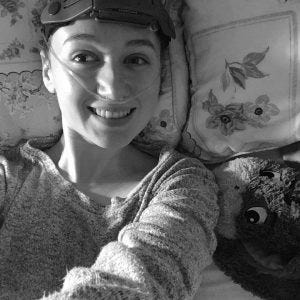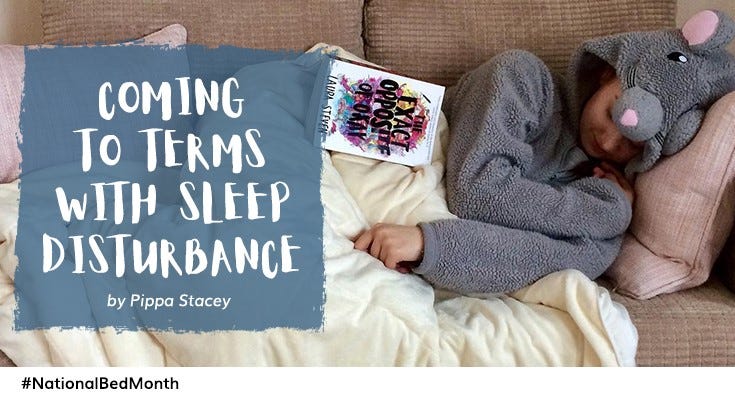
With March being National Bed Month, I thought I’d use today’s piece to discuss my experiences with a natural human function that continues to evade me… sleep. Y’know what’s really fun? Having a long-term condition that causes chronic fatigue, and yet simultaneously impacts your ability to achieve restorative sleep. Sleep issues are widely reported in my illness (ME/CFS), and whilst some people experience impairments such as hypersomnia, sleep reversal, restless legs syndrome, and many more, insomnia is the cross I’ve personally been given to bear.
At my worst, there would be weeks in a row where I’d be getting under four hours of sleep per night. There have been occasions where my alarm clock has gone off in the morning, and I hadn’t slept a wink. Five years on from my health decline and diagnosis, even if my sleep itself leaves a lot to be desired, my sleep hygiene (environmental and lifestyle recommendations to ensure your sleep is as restful as possible) is thoroughly in-check. My routine ensures I don’t drink caffeine after mid-afternoon or consume heavy meals in the evening, I don’t sleep in the day unless I feel as though I’m going to cease existing otherwise (it happens!), and I turn my phone off at least two hours before I go to bed.
Ironically, many sleep hygiene recommendations remain inaccessible for people with chronic illnesses: it isn’t always possible simply to exercise more if you have chronic pain, or expose yourself to daylight if you have light sensitivity, or implement dietary changes if your meals are prepared by a carer or PA. People always love to tell me that I’d sleep more if I could make myself do more in the day, by chucking my pacing and activity management out the window. However, I’ve actually found that the more I overexert myself in the day, the more severe my sleep disturbance becomes.
Over the years, I’ve seen specialists and occupational therapists and been prescribed various medications, with varying levels of success. And whilst there’s no doubt that my quality of sleep these days is generally far better than it once was, the insomnia and the aftermath I still experience remains one of my most challenging symptoms. Being completely physically and mentally drained, yet having your body stubbornly refuse to fall into the restorative state of rest it needs, can be truly awful.
The days following the nights I don’t sleep affect every waking minute of my life: the ability to work, socialise, and sometimes even breathe. It’s a really, really fun time. And once you’ve experienced health events of this kind, it’s inevitable that they have an effect on your mental wellbeing too. Not only would I feel incredibly low about what I was physically dealing with, I also began to experience worry and angst when it came to bedtime. When I knew I had something on the next day, I’d feel so anxious about getting enough sleep that this in itself also had a detrimental impact on the quality of my rest.
All these years, all I’ve wanted is something that will address this problem and solve it, whether it’s a course of medication, alternative therapies, or dare I say it, just one of my friends to occasionally whack me in the face and conk me out for an hour or two. Pining for a ‘cure’ is a tricky thing when it comes to chronic illness, but all I was fixated on was a solution. I felt sure (and to an extent, still feel sure) that if only I could sort my sleep, my other symptoms and general quality of life would hugely improve as a result. However, it was around this time last year when things marginally shifted in my head. I was having appointments and investigations with one of the leading sleep clinics in the country, and although abnormalities were found, it was concluded that I didn’t meet the criteria of any more complex sleep disorders.
At the time, I was absolutely gutted. Of course, nobody wants a sleep disorder and the numerous challenges they bring, but not having a diagnosis meant that there was no promise of treatment either. This was very much the end of the road. In the appointment before my discharge, however, the consultant said some things that have stuck with me ever since. Without invalidating my experiences and the harm that sleep disturbance has brought to my life, he gently explained that sometimes our own expectations can be a hindrance in their own right. If people have internalised the idea that they’re not getting enough sleep, they’re always going to feel as though they’re deprived.
Sometimes, one of the most productive things we can do is let go of those expectations, and just let it be. Although I continue to worry about the potential long-term effects of my sleep deprivation, from this point onwards I’ve made a conscious effort to let my own internalised beliefs go. I’m still here and I’m still functioning, and in all honesty, even if I had the most amazingly restorative night of sleep ever, deep down I know I’d still feel poorly from my condition the next day. I’m coming to terms with the fact that I have sleep disturbance, and there’s only so much I can do to influence the quality of my rest.
So now, instead of meticulously following sleep hygiene practice in the hope of enforcing good rest, I instead tailor that same advice to make the act of going to bed a more restful and enjoyable experience in itself. For those in a similar position, I’d recommend researching various models of bed (particularly adjustable beds which can be a saviour if you struggle to get comfy), and considering any additional aids that may benefit your unique symptoms, such as pressure relief props and various body pillows.
Don’t be afraid to experiment and find what best suits you: for reasons I’m yet to fathom, my own breakthrough to finding comfort and relaxation has been propping a pillow under my knees to slightly raise them and adjust my posture. Treat yourself to a lovely new pair of pyjamas you look forward to wearing, and perhaps even consider making-over your bedroom and ensuring it’s your happy place. I know dealing with sleep disturbance is hard, so incredibly hard, but no matter how the coming night treats you, you’re going to be okay. May sweet dreams come your way!
Visit our bedroom shop to discover all our beds and mattresses to help you sleep easier.


 Price Match Promise
Price Match Promise
 Next day delivery, 7 days a week
Next day delivery, 7 days a week
 Nationwide Showrooms
Nationwide Showrooms
 Rated Excellent
Rated Excellent







